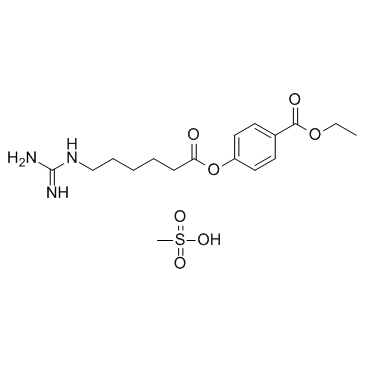The short term satiety peptide cholecystokinin reduces meal size and prolongs intermeal interval.
Dalya M Lateef, Martha C Washington, Ayman I Sayegh
文献索引:Peptides 32(6) , 1289-95, (2011)
全文:HTML全文
摘要
Camostat mesilate (or mesylate) releases endogenous cholecystokinin (CCK) or CCK-58, the only detectable endocrine form of CCK in the rat, and reduces cumulative food intake by activating CCK(1) receptor. However, the literature lacks meal pattern analysis and an appropriate dose-response curve for this peptide. Therefore, the current study determines meal size (MS), intermeal interval (IMI) and satiety ratio (SR) by orogastric gavage of camostat (0, 12.5, 25, 50, 100, 200, 300, 400, 800mg/kg) and compares them to those previously reported by a single dose of CCK-8 (1nmol/kg, i.p), the most utilized form of CCK. We found that camostat (200, 300, 400 and 800mg/kg) and CCK-8 reduced cumulative food intake and the size of the first meal, but only camostat prolonged IMI and increased SR. There was no change in the duration of the first two meals or in rated behaviors such as feeding, grooming, standing and resting in response to camostat and CCK-8, but there was more resting during the IMI in response to camostat. This study provides meal pattern analysis and an appropriate dose-response curve for camostat and CCK-8. Camostat reduces food intake by decreasing MS and prolonging IMI, whereas CCK-8 reduces food intake by reducing only meal size.Published by Elsevier Inc.
相关化合物
| 结构式 | 名称/CAS号 | 分子式 | 全部文献 |
|---|---|---|---|
 |
甲磺酸加贝酯
CAS:56974-61-9 |
C17H27N3O7S |
|
Involvement of proteinase activated receptor-2 in the vascul...
2014-04-01 [Clin. Sci. 126(8) , 545-56, (2014)] |
|
Role of TRPV1 in nociception and edema induced by monosodium...
2011-08-01 [Pain 152(8) , 1777-88, (2011)] |
|
Neonatal amygdala lesions advance pubertal timing in female ...
2015-01-01 [Psychoneuroendocrinology 51 , 307-17, (2014)] |
|
Effect of a serine protease inhibitor on the progression of ...
2012-10-15 [Am. J. Physiol. Renal Physiol. 303(8) , F1126-35, (2012)] |
|
Prospective comparative study of endoscopic papillary large ...
2012-09-01 [Scand. J. Gastroenterol. 47(8-9) , 1071-7, (2012)] |